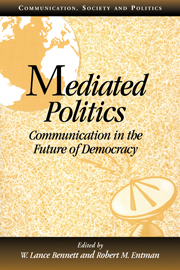Book contents
- Frontmatter
- Contents
- List of Figures
- List of Tables
- Contributors
- Preface
- Acknowledgments
- 1 Mediated Politics: An Introduction
- Part 1 Democracy and the Public Sphere
- Part 2 Citizens, Consumers, and Media in Transition
- Part 3 Mediated Political Information and Public Opinion
- 10 Reframing Public Opinion as We Have Known It
- 11 Political Waves and Democratic Discourse: Terrorism Waves During the Oslo Peace Process
- 12 Monica Lewinsky and the Mainsprings of American Politics
- 13 The Big Spin: Strategic Communication and the Transformation of Pluralist Democracy
- 14 The Impact of the New Media
- Part 4 Mediated Campaigns
- Part 5 Citizens: Present and Future
- Index
12 - Monica Lewinsky and the Mainsprings of American Politics
Published online by Cambridge University Press: 05 June 2012
- Frontmatter
- Contents
- List of Figures
- List of Tables
- Contributors
- Preface
- Acknowledgments
- 1 Mediated Politics: An Introduction
- Part 1 Democracy and the Public Sphere
- Part 2 Citizens, Consumers, and Media in Transition
- Part 3 Mediated Political Information and Public Opinion
- 10 Reframing Public Opinion as We Have Known It
- 11 Political Waves and Democratic Discourse: Terrorism Waves During the Oslo Peace Process
- 12 Monica Lewinsky and the Mainsprings of American Politics
- 13 The Big Spin: Strategic Communication and the Transformation of Pluralist Democracy
- 14 The Impact of the New Media
- Part 4 Mediated Campaigns
- Part 5 Citizens: Present and Future
- Index
Summary
Just before news of a sexual relationship between Bill Clinton and Monica Lewinsky became the talk of the nation, the president's job approval rating stood at 60 percent. Ten days later, following intense media coverage of the affair, Clinton's approval ratings, as measured by the same polling organizations, had risen to about 70 percent. Thus, the president not only survived the first round of Monicagate; he seemed to prosper.
Several months later, Clinton pulled off another miracle. One of the most enduring regularities of American politics is that the president's party loses seats in the House of Representatives in midterm elections. In the 1998 midterms, with the Congress threatening to impeach the president for lying to cover up his sexual misbehavior, a big loss for Clinton's party seemed especially likely. But when the votes were counted, the Democrats had actually gained seats in Congress, thereby surprising political scientists and maddening Clinton's enemies.
If anyone had previously doubted it, these two occurrences should be taken as final evidence that media frenzies over personal shortcomings are not the driving force of American politics. Stories of personal scandal can sell newspapers and provide opposition politicians with ammunition for rhetorical attack, but they do not in the end seem to make much difference for public opinion or national politics.
What, then, does move public opinion? What forces do drive American politics?
The argument of this chapter – hardly novel but sufficiently under appreciated that it bears making – is that presidents and their parties rise and fall in the public's esteem mainly according to how effectively they govern.
- Type
- Chapter
- Information
- Mediated PoliticsCommunication in the Future of Democracy, pp. 252 - 278Publisher: Cambridge University PressPrint publication year: 2000
- 5
- Cited by



